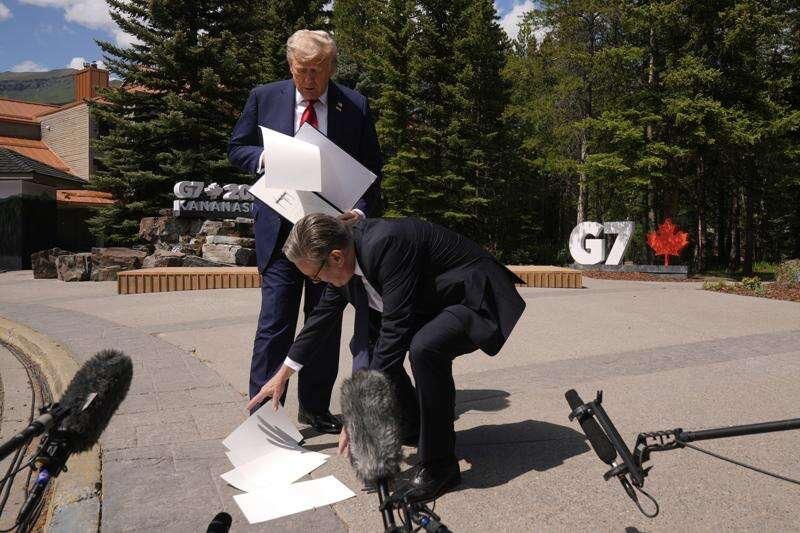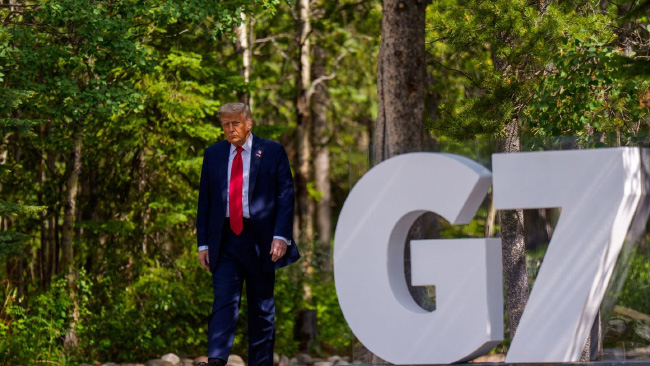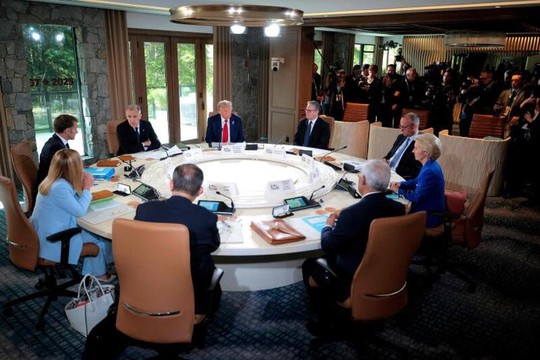A meeting at the G-7 Leaders' Summit-2025.
Photo: AFP
President Trump could have opened by talking about trade. He could have discussed the wars in the Middle East or the long-running, brutal war in Ukraine.
But there was something else that appeared to be top of mind for Mr. Trump during Monday’s meeting in Canada of the leaders of the Group of 7 industrialized nations: President Vladimir Putin of Russia, notes ‘The New York Times’.
“The G7 used to be the G8,” Mr. Trump told reporters, referring to the group’s decision to eject Russia in 2014.
He went on to blame former President Barack Obama and former Prime Minister Justin Trudeau of Canada for kicking Russia out.
At the same time, Prime Minister Keir Starmer of Britain, along with other European leaders, was expected to use the summit to announce another sanctions package against Russia. Mr. Starmer said in a statement that he wanted to “work with all of our G7 partners to squeeze Russia’s energy revenues and reduce the funds they are able to pour into their illegal war.”
Asked after a meeting with Mr. Starmer on Monday if the United States would join Europe in applying further sanctions, Mr. Trump downplayed the measure.
“Well, Europe is saying that, but they haven’t done it yet,” he said. “Let’s see them do it first.”
Mr. Trump said he was still waiting to see if a cease-fire deal could be made, adding that sanctions would also be costly for the United States. “It’s not just, let’s sign a document,” he said. “You’re talking about billions and billions of dollars. Sanctions are not that easy. It’s not just a one-way street.”
Mr. Trump, in recent months, has also indicated that he wants to all but wash his hands of the war in Ukraine, having grown frustrated by the lack of progress in negotiating a peace deal.
Experts said that Mr. Trump’s comments on Monday about welcoming Russia back into the fold of leading industrialized countries made clear his shifting goal post for the war.
President Trump departed early from the Group of 7 meeting in Canada on Monday night to deal with the rapidly escalating conflict between Iran and Israel.
Earlier on Monday, Mr. Trump had hinted to reporters that he was feeling pressure to be more engaged in the Middle East crisis, saying: “As soon as I leave here, we’re going to be doing something. But I have to leave here.”
Asked on Monday morning what it would take for the United States to get involved militarily on behalf of Israel in its attacks on Iran, Mr. Trump told reporters, “I don’t want to talk about that.”
Monday evening, as Mr. Trump departed Canada to return to Washington, he signed onto an Iran statement after all.
The statement was signed by the leaders of the group’s member nations — besides the United States and Canada, they are France, Germany, Italy, Britain and Japan — along with the leaders of the European Union. It acknowledges the need to prevent Iran from acquiring a nuclear weapon and explicitly supports Israel’s right to defend itself.
But it also calls on both sides to de-escalate in order to resolve the issue of Iran’s nuclear ambitions at the negotiating table, saying that diplomacy is the best way to resolve the dispute.
 Trump lost the text of the treaty with Britain. Starmer rushed to collect his text, which fell out of Trump's hands.
Trump lost the text of the treaty with Britain. Starmer rushed to collect his text, which fell out of Trump's hands.
Photo: AP
The G-7 has the potential to play a meaningful role in global governance: taking on a position the Trump administration does not want for the United States and addressing the problems of burden-sharing that appear to lie at the root of many of Trump’s concerns about U.S. global leadership, writes ‘Foreign Affairs’.
In previous meetings, G-7 members have made clear their interest in addressing technological advancements, public health, major wars, and other issues beyond the group’s traditional mandate. With many international institutions today paralyzed by geopolitical rivalries, the world needs concerted action now more than ever.
Yet to truly turn the G-7 into a body that can sustain the rules-based order, its members need to bolster their ranks, streamline their procedures, and strengthen the group’s legitimacy in the eyes of the world. Pulling off this reinvention would position the G-7 for leadership—and could even be the kind of sweeping project that appeals to Trump.
The G-7 must embrace reform to meet the moment. The world needs effective governance institutions, and to serve that purpose the G-7 needs to broaden its scope, enhance its capabilities, and add new voices to its deliberations. The first place to start is membership. Expanding the G-7 is not without controversy. Many of the group’s representatives value its exclusiveness and worry that adding new members could make it as unwieldy as the G-20. But if the G-7 is to take on additional responsibilities, it will need additional partners with commensurate capabilities to share the work. The body today is also geographically imbalanced. European countries or institutions hold six of its nine seats. Just one country, Japan, represents the whole of Asia, and no member represents the developing world.
Australia and South Korea should be at the front of the line to join the G-7. G-7 representatives opine that any new members must be responsible stewards of the international economy, be capable of and committed to assuming this role, and, importantly, have the trust of the other G-7 members. Canberra and Seoul clearly meet this standard. Australia has a per capita GDP larger than all G-7 states except the United States; among democracies it has the 12th largest economy in the world. South Korea is a technological and cultural powerhouse and has the largest economy among non-G-7 industrialized democracies except for India and Brazil. Australia has fought on the side of democracy and a rules-based order in every major war since World War I; South Korea has done so since the Korean War.
The Indo-Pacific region now is the center of gravity in global commerce and, arguably, in global politics. Adding Australia and South Korea to the G-7 could boost the representation of the wider Indo-Pacific, giving the region’s interests a stronger voice than Japan can offer alone. To further balance the G-7’s configuration, the EU’s two seats in the body should also be consolidated into one. If the European G-7 members demand that the open seat go to another European country—several of which perform respectably in the G-7’s priority areas—Spain could be a good candidate. According to the 2024 CSIS study, Spain ranked higher than the lowest-ranked G-7 member, Italy, on four out of the seven priority issue areas—and performed better on climate change issues (33 metrics) than all G-7 countries except Germany and the United Kingdom. As a member, Spain could expand the G-7’s reach by providing Spanish-speaking representation, which has been absent from the group. By extension, Spain’s membership could provide a bridge between the G-7 and Latin America.
Institutional reform could also make the G-7 more effective. At present, the agenda for each summit is set by the host country in an informal process. This makes the group flexible, open to frank discussions, and able to act quickly, but the downside is that G-7 efforts lack consistency. At the close of the 2023 Hiroshima summit, for example, G-7 leaders laid out an ambitious agenda to establish a G-7 Coordination Platform on Economic Coercion by authoritarian regimes, as well as guiding principles on the development of advanced AI systems. Then, at the next meeting, in 2024, the host, Italy, chose to focus on migration from North Africa. G-7 summit in Canada focuses on energy security and accelerating the digital transition. All of these issues are important. But the discontinuity in the G-7’s agenda sends confusing signals to the rest of the world and results in the body not following through on its announced commitments.
To solve this problem, the structure of the G-7 must be reformed. In particular, a consultative body, or troika, composed of representatives from the past, current, and next year’s G-7 hosts should set G-7 meeting agendas, replacing today’s informal system. The current host would invite the previous host and the successor host together to plan out the year’s conferences. Planning annual conferences in this way would give the meetings more continuity from year to year.
In addition, establishing a permanent secretariat would provide the G-7 with an administrative home, regular staff support for the troika and the related task forces, and an archive for G-7 deliverables.
Emerging and middle powers and countries in the global South must also be more involved in a reimagined G-7. The list should include multilateral organizations, such as the African Union, the Asia-Pacific Economic Cooperation forum, the Association of Southeast Asian Nations, the Organization of Islamic Cooperation, and the G-20, as well as prominent countries outside the G-7, particularly China.
Institutionalizing outreach to developing economies in this way could demonstrate the G-7’s commitment to inclusivity and confer more legitimacy on its decisions. In the near term, the G-7 could engage outside countries on issues of proximate concern by supporting their economic development and climate goals, fostering new norms and standards for AI and other emerging technologies, and shaping their opposition to disruption to the global order by China, Iran, North Korea, and Russia.
For years, G-7 members have resisted the impetus for reform. That resistance was tolerated because global governance institutions were functioning, the United States helped to underwrite world order, and there was general stability in the international system. The leaders meet in Canada need to recognize that none of these conditions hold today, and that a new, reimagined G-7 needs to step up to fill the void.
Trump’s “America first” inclinations are a part of the reason for the disarray in the world today, as the United States’ disenchantment with leadership creates a void in global governance. If that void is left unfilled, other actors or institutions may seek to impose less desirable and even dangerous forms of rule. It would be far better for the G-7 to serve as the champion of a rules-based system that the world so urgently needs.
 All alone…
All alone…
Photo: Stern.de
read more in our Telegram-channel https://t.me/The_International_Affairs

 11:30 18.06.2025 •
11:30 18.06.2025 •























